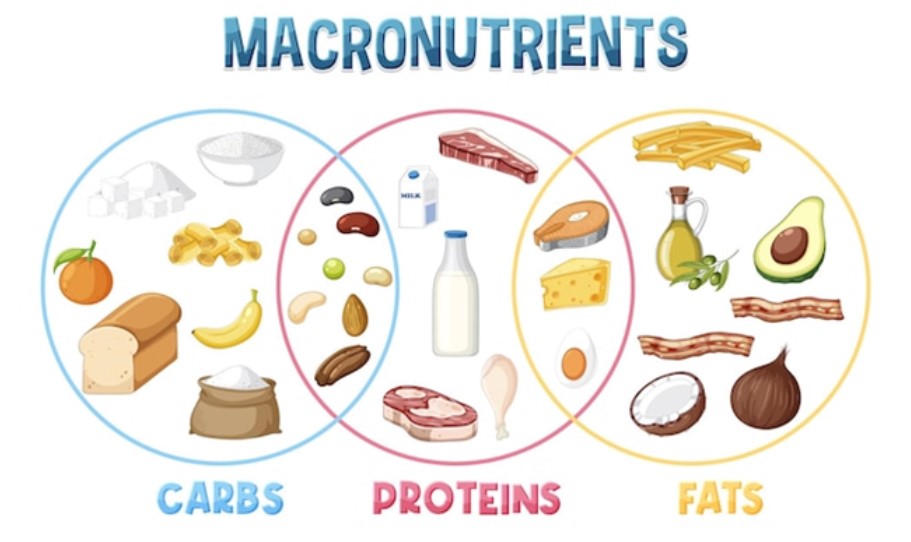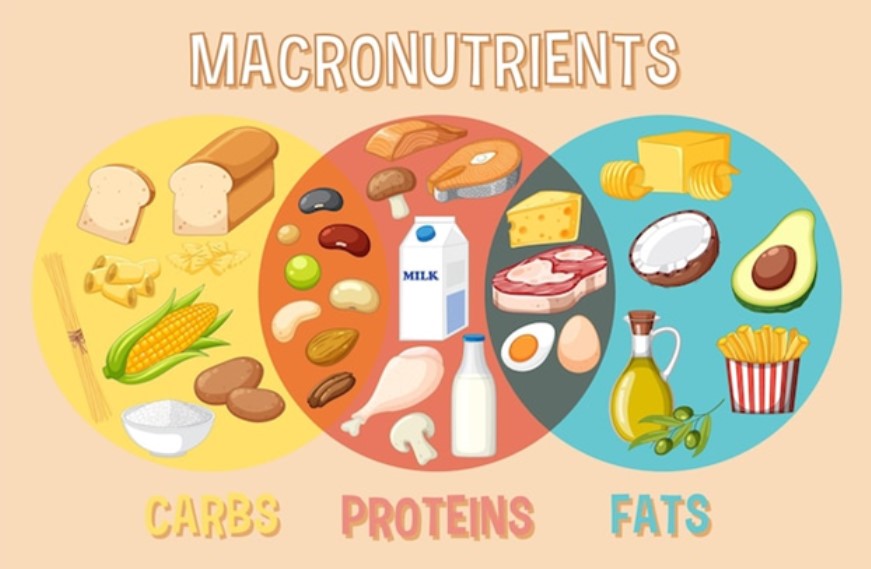In this blog, we will explain everything you need to know about macro-nutrient, carbohydrates, and fats. Learn about their functions in your body, how much of each you need, and where to find them in your diet. We will also discuss different types of diets that focus on macros and how to balance them for optimal health.
Are you confused about what to eat and how much to eat? Have you heard the term “macros” thrown around but have no idea what it means or why it’s important?
Read on if you want to understand the importance of macros and how they can help you achieve your fitness goals.
What Are Macro-Nutrients?
Macronutrients are nutrients that your body needs in large amounts to function properly. The three main macronutrients are carbohydrates, protein, and fat.
- Carbohydrates are the body’s main source of energy: They are found in foods such as bread, pasta, rice, fruits, vegetables, and milk.
- Protein is essential for building and repairing tissues: It is found in foods such as meat, poultry, fish, eggs, dairy products, beans, and nuts.
- Fat is also a source of energy and is needed for the absorption of some vitamins: It is found in foods such as meat, poultry, fish, dairy products, nuts, and seeds.
In addition to providing energy, macronutrients also play other important roles in the body. For example, carbohydrates are needed for brain function, protein is needed for muscle growth, and fat is needed for insulation and protection of organs.
The amount of macronutrients that you need each day depends on your age, sex, activity level, and overall health. A registered dietitian can help you create a personalized meal plan that meets your individual needs.

Why Are Macros Important?
Macros, or macronutrients, are the nutrients that your body needs in large amounts. They include carbohydrates, protein, and fat. Each macro has a different role in your body:
- Carbohydrates are your body’s main source of energy. They are broken down into glucose, which is used by cells for fuel.
- Protein is essential for building and repairing tissues. It is also involved in many other bodily functions, such as hormone production and immune function.
- Fat is an important source of energy and essential fatty acids. It also helps to protect your organs and insulate your body.
Macronutrients are important for overall health and well-being. They can help you to:
- Maintain a healthy weight
- Build muscle
- Improve athletic performance
- Reduce your risk of chronic diseases
How Much Macros Do You Need?
The amount of macros you need depends on your individual needs, including your age, sex, activity level, and health goals. However, as a general guide, the National Academies of Sciences, Engineering, and Medicine (NASEM) recommends that adults get the following percentages of their calories from each macronutrient:
- Protein: 10-35%
- Carbohydrates: 45-65%
- Fats: 20-35%
These percentages are just a starting point, and you may need to adjust them based on your individual needs. For example, if you are trying to lose weight, you may need to reduce your calorie intake and increase your protein intake. Or, if you are an athlete, you may need to increase your carbohydrate intake to fuel your workouts.
It is important to note that macros are not the only thing that matters when it comes to nutrition. You also need to make sure that you are getting enough vitamins, minerals, and other nutrients. A healthy diet is one that is balanced and varied, and that includes a variety of whole foods.

What Are Carbs?
Carbohydrates are a vital part of a healthy diet, providing energy for physical and mental activity. They come in two types: simple, which provide quick energy but should be consumed in moderation, and complex, which release energy over time and should be prioritized. Choosing healthy sources of carbohydrates is crucial for overall health.
Why Do You Need Carbs?
Carbs are crucial for energy, brain function, and metabolism. They regulate blood sugar levels and provide fiber and nutrients when chosen wisely (whole grains, fruits, veggies). However, balancing carb intake with other macronutrients is key for overall health.
What Is Protein?
Protein is a vital nutrient for tissue building and repair, composed of amino acids that make up muscles, organs, and tissues. Adequate protein intake can promote weight loss, muscle growth, and overall health. Meat, fish, eggs, dairy products, nuts, and beans are excellent sources of protein. Consuming a balanced diet with the appropriate amount of protein is essential for individual needs.
Why Do You Need Protein?
Protein is crucial for tissue repair and growth, enzyme and hormone production, blood sugar regulation, and weight management. Inadequate protein intake can lead to muscle loss, weakened immunity, and slow healing. Meat, fish, beans, nuts are good sources of protein.
How Much Protein Should You Eat?
Protein is vital for tissue repair and muscle growth, but the daily intake varies with age, gender, and activity level. Adults require 0.8g of protein per kg body weight, while athletes need more. Choose high-quality sources like lean meats, eggs, dairy products, beans, and lentils.
Fats
Healthy fats such as avocados, nuts, and fatty fish are essential macronutrients providing energy, insulation & organ protection. Choosing them wisely is crucial as higher intakes of unhealthy fats like trans-fat can lead to heart diseases & other health issues. It’s important to remember that not all fats are created equal!

What Are Fats?
Fats are a nutrient that gives the body energy and aids vitamin absorption. The three types of fats are saturated, unsaturated, and trans fats. While excessive consumption of saturated fats found in meat and dairy products can increase heart disease risk, unsaturated fats from sources like nuts and fish can improve cholesterol levels. Trans fats, usually in processed foods, also raise heart disease risk.
Why Do You Need Fats?
Fats are essential for the body as they provide energy, aid in vitamin and mineral absorption, and regulate hormones. However, not all fats are equal; unsaturated fats like omega-3 and omega-6 are healthy while saturated fats should be consumed in moderation due to their potential risk of heart disease. Trans fats found in processed foods should be avoided. A balanced diet with a variety of healthy fats is crucial for optimal health.
How Much Fat Should You Eat?
The amount of fat you should eat varies based on factors like age, gender, and activity level. While fats are necessary for nutrient absorption and energy, excessive saturated and trans fat intake can lead to heart disease. Opt for healthy fats like monounsaturated and polyunsaturated fats, and balance your intake with protein and carbs for overall health.
What Is the Ideal Macro-Nutrient Ratio?
The ideal macronutrient ratio varies based on goals and needs, like weight loss or muscle gain. While the 40/30/30 ratio is common, different ratios may benefit individuals depending on body type, activity level, and health conditions. It’s crucial to focus on whole foods that balance all three macronutrients and track intake for optimal results.
How to Determine Your Macro-Nutrient Ratio?
Determining your macronutrient ratio depends on your health goals, activity level, and body type. Generally, a balanced ratio includes 40% carbs, 30% protein, and 30% fat. Athletes need more protein for muscle growth while weight loss may benefit from higher protein and lower carb intake. Always consult a professional before altering your diet.
Best Macro-Nutrient Sources for a Healthy Diet
There are three main macronutrients: carbohydrates, protein, and fat. Each macronutrient plays an important role in your health.
- Carbohydrates are your body’s main source of energy. They are found in foods like bread, pasta, rice, fruits, vegetables, and milk.
- Protein is essential for building and repairing tissues. It is found in foods like meat, poultry, fish, eggs, dairy products, beans, and nuts.
- Fat is also essential for your health. It helps to protect your organs, insulate your body, and absorb vitamins. It is found in foods like meat, poultry, fish, dairy products, nuts, seeds, and oils.
The best way to get the nutrients you need is to eat a variety of healthy foods. Here are some of the best sources of each macronutrient:
Carbohydrates
- Whole grains: brown rice, quinoa, oats, whole-wheat bread, whole-wheat pasta
- Fruits: bananas, apples, oranges, berries
- Vegetables: potatoes, corn, carrots, peas
Protein
- Lean meats: chicken, turkey, fish
- Eggs
- Dairy products: milk, yogurt, cheese
- Beans, lentils, and peas
- Nuts and seeds
Fat
- Unsaturated fats: olive oil, canola oil, nuts, seeds
- Omega-3 fatty acids: fish, flaxseed oil, chia seeds
It is also important to limit your intake of unhealthy fats, such as saturated and trans fats. These fats can increase your risk of heart disease and other health problems. Saturated fats are found in animal products, such as meat, poultry, and dairy products. Trans fats are found in processed foods, such as fried foods, baked goods, and frozen dinners.
By eating a variety of healthy foods and limiting your intake of unhealthy fats, you can get the nutrients you need and improve your overall health.
Different Types of Macro-Nutrient Diets
There are many different types of macronutrient diets, each with its own set of benefits and drawbacks. Some of the most popular types of macronutrient diets include:
- Low-carb diets are high in protein and fat, and low in carbohydrates. These diets can help you lose weight quickly, but they can also be difficult to follow and may not be sustainable for long-term weight loss.
- High-protein diets are high in protein and moderate in carbohydrates and fat. These diets can help you build muscle and lose weight, but they can also be high in calories.
- Low-fat diets are low in fat and moderate in carbohydrates and protein. These diets can help you lose weight, but they may not be as effective as other types of diets for long-term weight loss.
- Mediterranean diet is a healthy diet that is rich in fruits, vegetables, whole grains, and healthy fats. This diet has been shown to improve heart health, reduce the risk of cancer, and help you lose weight.
- Plant-based diet is a diet that is free of animal products. This diet can be healthy and sustainable, but it is important to make sure that you are getting enough protein and other nutrients.
It is important to talk to your doctor or a registered dietitian before starting any new diet, especially if you have any health conditions. They can help you create a diet that is right for you and your individual needs.
Let’s Sum Up
In conclusion, macronutrients play a crucial role in our body’s everyday functioning. They provide us with the energy we need to go about our daily lives and perform physical tasks. It’s important to maintain a balance between all three macronutrients – protein, carbs, and fat – to ensure your body is receiving all the necessary nutrients. The ideal macronutrient ratio varies from person to person, depending on factors such as age, gender, physical activity level, and overall health goals.



